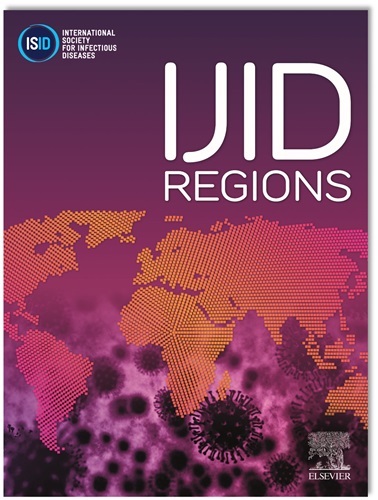测定接种单价野生型灭活全病毒或 mRNA 疫苗或作为额外加强剂的二价 WT/BA.4-5 COVID-19 mRNA 疫苗的成人体内针对 XBB 变体的 T 细胞反应。
IF 4.8
2区 医学
Q1 INFECTIOUS DISEASES
引用次数: 0
摘要
目的:由于 SARS-CoV-2 病毒的进化速度比疫苗的更新速度更快,T 细胞免疫可能会对疾病的恶化和新变种的死亡起到保护作用。方法:我们在香港招募了 292 名成年人,他们都曾接种过单价野生型疫苗(灭活病毒或 mRNA)(群组 1)或二价 WT/BA.4-5 mRNA 疫苗(群组 2)的第二/第三加强针。所有参与者都没有最近感染过 SARS-CoV-2 的血清学证据。每位参与者在接种前和接种后一个月采集了血液样本。流式细胞术和中和试验分别测定了 T 细胞和抗体反应。在所有疫苗接种策略中,只有接种过二价疫苗作为第三剂加强剂的成人对XBB变异株产生了明显的T细胞反应。单价或二价mRNA疫苗都能诱导针对不同XBB变体的抗体,但作为第二/第三加强剂的灭活病毒疫苗不能。作为第三加强剂接种二价 mRNA 疫苗可诱导针对 XBB 的 T 细胞和抗体反应。本文章由计算机程序翻译,如有差异,请以英文原文为准。
Determination of T cell response against XBB variants in adults who received either monovalent wild-type inactivated whole virus or mRNA vaccine or bivalent WT/BA.4-5 COVID-19 mRNA vaccine as the additional booster
Objectives
As the SARS-CoV-2 virus evolves more rapidly than vaccines are updated, T cell immunity potentially confers protection against disease progression and death from new variants. In this study, we aimed to assess whether the current boosting vaccination schemes offer sufficient T cell protection against new SARS-CoV-2 variants.
Methods
A total of 292 adults who had received the second booster of either monovalent wild-type (WT) vaccines (inactivated virus or mRNA) (Cohort 1) or the second/third booster of bivalent WT/BA.4-5 mRNA vaccine (Cohort 2) were recruited in Hong Kong. All participants showed no serological evidence of recent infection of SARS-CoV-2. Blood samples of each participant were collected before and 1 month after receiving the booster. T cell and antibody responses were determined by flow cytometry and neutralization test, respectively.
Results
Among all vaccination strategies, only the adults who had received the bivalent vaccine as the third booster dose significantly elicited T cell responses to the XBB variant. Either monovalent or bivalent mRNA but not inactivated virus vaccine as the second/third booster induced antibody against different XBB variants.
Conclusion
Receiving bivalent mRNA vaccine as the third booster is preferable to induce both T cell and antibody responses against XBB.
求助全文
通过发布文献求助,成功后即可免费获取论文全文。
去求助
来源期刊
CiteScore
18.90
自引率
2.40%
发文量
1020
审稿时长
30 days
期刊介绍:
International Journal of Infectious Diseases (IJID)
Publisher: International Society for Infectious Diseases
Publication Frequency: Monthly
Type: Peer-reviewed, Open Access
Scope:
Publishes original clinical and laboratory-based research.
Reports clinical trials, reviews, and some case reports.
Focuses on epidemiology, clinical diagnosis, treatment, and control of infectious diseases.
Emphasizes diseases common in under-resourced countries.

 求助内容:
求助内容: 应助结果提醒方式:
应助结果提醒方式:


